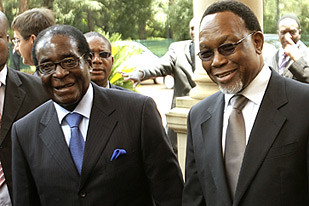
Zimbabwe President Robert Mugabe along with South African Deputy President Kgalema Motlanthe at a regional summit to discuss the situation in the Southern Africa region., a photo by Pan-African News Wire File Photos on Flickr.
SA’s land policy to elbow out foreigners
Friday, 15 February 2013 00:00
Deputy President Kgalema Motlanthe
JOHANNESBURG — Foreign nationals will no longer be able to own land in South Africa once the government’s land policy is finalised and passed into law, Rural Development and Land Reform
Minister Gugile Nkwinti said on Tuesday.
“All people who are foreign nationals will not own land, but will lease land on a long-term basis.”
Mr Nkwinti was responding to a question during a “dialogue” with farm workers in the Western Cape town of Paarl.
He said the government had completed an audit of state-owned land, but was busy with its audit of public and private land.
“Privately owned land includes land which is owned by foreigners. We are still busy auditing all of that land,” he said.
“When we’ve finished that, the policy of government, which will kick in at that point — because at the moment, remember, it’s privately owned land — after we conclude that in Cabinet, and Parliament promulgates the law, it will then say: ‘All people who are foreign nationals will not own land, but will lease land on a long-term basis’.”
Mr Nkwinti told his audience the matter was being attended to by government.
Meanwhile, Deputy President Kgalema Motlanthe and several senior cabinet ministers at the same gathering with farmers and farm workers in Paarl, promised to ameliorate the situation of both sides in the face of the impending wage hike for the sector.
Although the atmosphere was notable for its positive tone, the support measures offered by government fell somewhat short of what both constituencies said was needed to help the sector over the shock of the increase, which takes effect next month.
Minister of Trade and Industry Rob Davies promised stronger support in creating marketing channels and in assisting agriculture in “clawing back the value chain” and remaining competitive.
The minister said markets that had been lost due to the negative perceptions of South Africa could be won back if farmers committed themselves to fair labour practices, which in turn would allow products to be promoted as fair trade products.
Mr Motlanthe and Mr Davies both acknowledged that the sector was differentiated and that the R105 minimum wage was “a blunt instrument”.
A request from wine farmer Beyers Truter for a direct wage subsidy for workers to create more jobs received a response from Agriculture, Forestry and Fisheries Minister Tina Joemat-Pettersson that the subsidy was still a work in progress. Mr Truter said: “I think a lot of jobs will be lost because farmers will cut those who aren’t performing.
“We want to provide jobs. We want to employ more people, but with this increase we cannot.”
A direct subsidy to workers could help farmers “adjust to the shock” of the new wage and could be temporary, he suggested.
Farmers also requested closer working relationships between government departments and industry bodies to deal with “the game-changer” that the strike had brought.
Additional measures that farmers could make use of were the government’s training lay-off scheme, which allows employers to enlist workers who face retrenchment in training schemes where they receive a government stipend; and application to the Jobs Fund.
Concerns raised by farm workers included the threat of retrenchment and evictions, victimisation by farmers in the aftermath of the strike, information on land redistribution and black economic empowerment farming schemes and basic housing and transport facilities.
— Business Day.
No comments:
Post a Comment